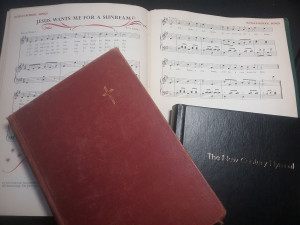Just what are hymns, anyway?
Our hymnals contain three basic categories of congregational songs to be sung:
HYMNS: speaks to and of God, is one of praise and adoration. It is celebration of God, song directed to God (“Our God, Our Help In Ages Past”).
PSALMS: scripture set to music (“The Lord’s My Shepherd, I’ll Not Want”)
SPIRITUAL SONGS: testimony of a spiritual theme (“Softly and Tenderly Jesus is Calling”).
A hymn is a congregational song of praise directed to God. A hymn has stanzas, and its lyrics are a “metered” poem meant to be sung. The traditional “common meter” for English hymns is 8.6.8.6 (syllables per line). “O Little Town of Bethlehem” and “Amazing Grace” are just two examples of hymns whose lyrics could be interchanged because the share the same meter.
In scripture we read that people have sung hymns since the time of Moses. David sang hymns of praise and is credited with writing many. Jesus and His disciples sang a hymn together at the Last Supper. The early church sang hymns as part of their regular meetings. Paul and Silas, with their feet in stocks in a Philippian jail, were reported to be praying and singing hymns.
It’s been said a Spirit-filled Christian is a singing Christian.” In Ephesians 5 we read this advice, “…be filled with the Spirit, as you sing psalms and hymns and spiritual songs among yourselves, singing and making melody to the Lord in your hearts, giving thanks to God the Father at all times and for everything in the name of our Lord Jesus Christ.”
Just as whistling is a natural reaction to a stroll on a fine summer’s day, so too is bursting out in exuberant congregational singing a natural reaction to being filled with the Spirit!

